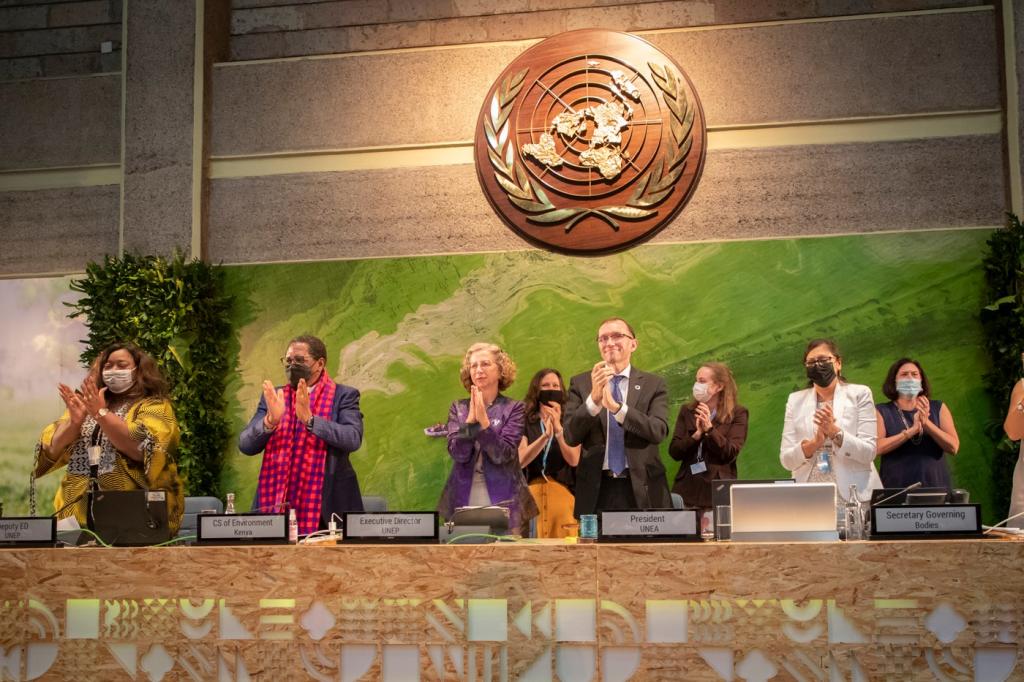|
Getting your Trinity Audio player ready…
|
By Baboloki Semele
Kenya, or rather Africa has scored a major win after countries directed the United Nations Environment Programme (UNEP) to return all its key departments to Nairobi. Although UNEP is headquartered in Nairobi, African nations complained the Kenya office was just a shell because key departments are based in Europe, where their high-level meetings are held. On Thursday last week ministers who attended the UN Environment Assembly said this must stop. Minister signed a political declaration directing all these departments to return to Kenya and their meetings to be held in Nairobi. Other institutions affiliated with Unep were asked to bring their meetings to Nairobi.
The ministers said the governing bodies of all the multilateral environmental agreements, in particular those hosted by the United Nations Environment Programme, to consider convening, within their mandates, their meetings more frequently in Nairobi. They said not only must Unep offices in Gigiri be upgraded, but all UN member states who have not joined the programme should now do so. The ministers said the matter was already settled at the UN General Assembly, where members agreed to strengthen the Nairobi office.
In a resolution availed to this publication, the ministers invited all member states and members of specialised agencies who have not yet done so, to become accredited to the United Nations Environment Programme. In taking particular interest in the adoption of General Assembly resolution 76/246, ministers underline the need to continue improving the United Nations Office at Nairobi, as the only United Nations headquarters duty station in the global South and the host of the headquarters of the Unep and, furthermore, invite the United Nations Office at Nairobi to provide more competitive services. In 2018, former Unep executive director Eric Solheim resigned following revelations that he was working in Europe, away from Nairobi, 80 percent of the time.
The ministers also stressed the importance of advancing equitable geographic distribution and gender parity among the staff of the secretariat of the UNEP, particularly in professional and senior-level positions. Currently, Africans are underrepresented in those positions, although the body is based on the continent. UNEP will now be required to regularly report to the Committee of Permanent Representatives on progress achieved on the diversity of its staff. The agreement was signed by heads of state and government, ministers, and high-level representatives, at the special session of the UNEP to mark 50 years since its establishment at the KICC in 1972.
Meanwhile, this was not the only cheer at the meeting which ended last week, as GIGIRI experienced Jubilation and cheers of joy rent the air at the fifth session of the United Nations Environmental Assembly (UNEA-5) at Nairobi, Kenya, as representatives of 175 states unanimously adopted an ambitious resolution March 2, 2022, calling for the establishment of a legally binding treaty to end plastics pollution by 2024. The mood of the delegates at the main hall of the UN complex turned festive as soon as UNEA President Espen Barth Eide read the resolution and declared it as unanimously endorsed, the last in a raft of 14 passed during the final session of the event.
The assembly that included environment ministers of various nations endorsed the landmark agreement during the plenary in what was described by UNEP Executive-Director Inger Andersen as the “most important multilateral environmental deal since the Paris Agreement of 2015”. An Intergovernmental Negotiating Committee (INC) will be constituted following the ‘historic’ resolution. It will commence deliberations and convene a forum before the end of 2022, open to all interested parties, to share knowledge and best practices in different parts of the world.
“The world is demanding that we act on plastic pollution, the negotiators have delivered the first step in this process by agreeing to establish an INC that will forge a global agreement on plastic pollution,” Andersen said. She added:
The upcoming pact comes at a time when plastic production has risen exponentially in the last few decades, she said. “The production volume is around 400 million tonnes per year and is expected to double by 2040.”
It will, however, only truly count if it has clear provisions that are legal and adopts a full life-cycle approach, stretching from design to production to circularity to reducing, managing, and preventing waste, Andersen added.
The negotiations will make for a highly ambitious timeframe of only two years, she noted. “They will reflect the member states’ understanding of the urgency to make progress on the critical environmental challenge of plastic pollution.”
She acknowledged that thorny issues will be encountered during the negotiations period, mostly related to the speed of the process and clarity of goals to be included in the draft. However, the private sector as producers of plastics will be brought into the deliberations, which could help hasten the process, she told a media conference later in the evening.
Leila Benali, Morocco’s Minister of Energy Transition and Sustainable Development said the passing of the resolution brought nature to the room and proved that multilateralism was still alive despite being tested. She is the newly appointed President of UNEA-6.
The minister, who immediately takes over as president of the sixth session of the assembly that will deliver the agreement, reckoned that there will be challenges in delivering the treaty by 2024, posed to governments by the private and the civil society.
She also expressed optimism that the treaty will be crafted as scheduled in the spirit of multilateralism demonstrated in crafting the resolution.
A resolution for establishing a Science Policy Panel for UNEP on the management of chemicals and waste was passed at the assembly. It will be a science think tank similar to the prominent Intergovernmental Panel on Climate Change (IPCC). It will guide decisions made on the environment using science, the minister said, and according to Andersen it might take time before it is operational “just like it did with the IPCC”.
